Episodes
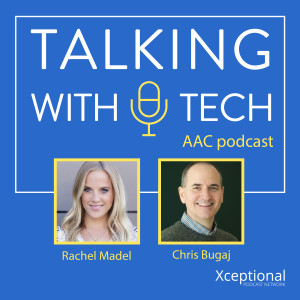
Wednesday Feb 05, 2020
Wednesday Feb 05, 2020
This week, we have the privilege of presenting Rachel’s interview with Hannah Foley, a senior at University of Illinois who is pursuing a career in Assistive Technology & AAC. Hannah has cerebral palsy and is an incredible adult AAC user who works as an ambassador for Saltillo!
Before the interview, Rachel & Chris talk about Christine Derse’s article, A Call for Consistency in AAC Picture Systems. Rachel and Chris discuss their agreement that using different symbols sets can be confusing at times, but note it isn’t clear a universal symbol set would lead to better modeling. For example, adults often use labels, rather than pictures, when modeling, and once a motor plan is in place the pictures become less important.
Key ideas this week:
🔑 Initially, Hannah was against using AAC because she felt her dedicated device was unsightly and it made her feel even more different. Working with Matt Baud, she came to see the importance of communication for her independence and started using an iPad.
🔑 Response time is incredibly important when communicating with an AAC user - it is critical that we give enough time to respond and become comfortable with silence.
🔑 People often assume that Hannah is intellectually impaired, can’t go to college, or manage her care independently because she uses AAC. This is, of course, totally incorrect!
We need help from our listeners to keep Talking with Tech going - please support our podcast at patreon.com/talkingwithtech.
Visit bit.ly/twtpod for access to previous episodes, resources, and CEU credits that you can earn for listening to TWT episodes!
Resources
Hannah Foley's blog post - Overcoming AAC Resistance: Communication is Key.
Schlosser, R. W., Brock, K. L., Koul, R., Shane, H., & Flynn, S. (2019). Does Animation Facilitate Understanding of Graphic Symbols Representing Verbs in Children With Autism Spectrum Disorder?. Journal of Speech, Language, and Hearing Research, 62(4), 965-978.

Wednesday Jan 29, 2020
Wednesday Jan 29, 2020
We need your help to keep Talking with Tech going strong! If you are a loyal listener, please support our podcast at patreon.com/talkingwithtech.
This week, Chris and Rachel talk about Chris’s takeaways from the Future of Education Technology conference, a place for teachers, coaches, and administrations can learn about ed tech, including using tech to increase inclusion.
🔑 E-sports was a big topic of discussion at FETC. E-sports allow for more inclusion because students who cannot participate in traditional sports can still play video games. Students can collaborate and interact in an authentic way with peers in a team environment and participate on twitch.com
🔑 The FETC keynote speaker Daniel Pink who discussed the relationship between timing and performance. You want to do analytical tasks in the morning and the afternoon is the “trough” which is better for more routine tasks. We can help students with low motivation to perform better by scheduling them in the morning.
🔑 Carol Allen talked about early childhood education and introducing students to educational technology at a very early age. Don’t be the “lid on the flea jar”, as seen in this video (https://youtu.be/v-Dn2KEjPuc), by setting low expectations for students.
🔑 Jane Odom talks with Chris about the new “voice control” feature on Apple iOS where you can use a real or synthesized voice to interact with everything on an iOS device. This has opened up opportunities for AAC users to become more independent in exciting ways!
Visit bit.ly/twtpod for access to previous episodes, resources, and CEU credits that you can earn for listening to TWT episodes!

Wednesday Jan 22, 2020
Wednesday Jan 22, 2020
We need your help to keep Talking with Tech going strong! If you are a loyal listener, please support our podcast at patreon.com/talkingwithtech.
This week, Chris interviews Matt Levac of ACCEL and David Reno of Southwest Human Development about making assistive tech and developing the “Makers of Change AT Challenge”. Matt and David discuss why making AT for each child can be so important, how recent technology like 3D printing has changed AT making, and how they leveraged the technical expertise of local students through the “Makers of Change AT Challenge” to solve real problems for people with disabilities.
Before the interview, Rachel and Chris connect about getting clients to communicate with carrier phrases and doing fun and silly activities to engage students. They also discuss their experience finding their creative flow in therapy or writing, and how it can be a powerful way to produce a great deal of creative content.
Key ideas this week:
🔑 The Makers of Change AT Challenge takes advantage of the technical skills of students to work on real-world problems facing people with disabilities. One year, students integrated internet-connected sensors into equipment so therapists could get better data about how equipment is being used.
🔑 The Makers of Change AT Challenge is looking for teams across the country to get involved next fall to work on the challenges independently and send in their solutions remotely. Learn more at Atmakerschallenge.com.
🔑 Access free AT resources and “Open AT” solutions at www.makersmakingchange.com and atmakers.org.
Visit bit.ly/twtpod for access to previous episodes, resources, and CEU credits that you can earn for listening to TWT episodes!
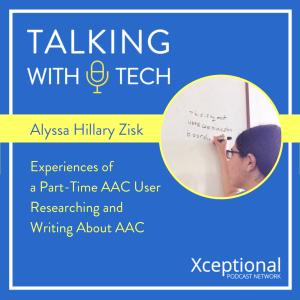
Wednesday Jan 15, 2020
Wednesday Jan 15, 2020
We need your help to keep Talking with Tech going strong! If you are a loyal listener, please support our podcast at patreon.com/talkingwithtech.
This week, the TWT team is excited to share Rachel’s interview with Alyssa Hillary Zisk, an Autistic adult who is a “part-time AAC user” and a previous guest of the pod! Part-time AAC users have the ability to communicate verbally, but there are times when verbal speech is difficult and non-verbal communication is preferred.
Before the interview, Rachel shares about all of her new technology she purchased recently, and shares tips on using an Apple Pencil to become more organized and use less paper in therapy!
Key ideas this week:
🔑 Alyssa discusses their new article, “Am I the Curriculum?”. They discuss how and why being a part-time AAC user, taking an AAC course, and doing AAC research was “systemically awkward” because of many inconsistencies in the field, including our definitions of AAC and who uses AAC.
🔑 Parents may be resistant to AAC because want their child to use verbal speech, but we should empower individuals to use whatever communication method they find beneficial in that moment.
🔑 Alyssa prefers identity-first language (Autistic adult) rather than people-first language (person with autism) when talking about their autism. This perspective is not always respected in the field of AAC - in fact, some AAC journals refuse to accept submissions with identity-first language, even when the author is talking about themselves.
Visit bit.ly/twtpod for access to previous episodes, resources, and CEU credits that you can earn for listening to TWT episodes!
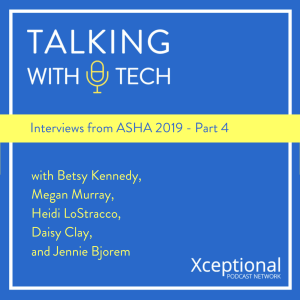
Wednesday Jan 08, 2020
Wednesday Jan 08, 2020
We need your help to keep Talking with Tech going strong! If you are a loyal listener, please support our podcast at patreon.com/talkingwithtech.
TWT presents the last, but not least, collection of interviews by Rachel recorded at ASHA 2019! Before the interviews, Rachel and Chris talk about some gems from Chris’s upcoming presentations at FETC about inclusive design, flexible learning spaces, and teaching through coding with robots. They also chat about ATIA, where Chris will be doing a pre-conference on writing, an “AT Feud” Family Feud style game, an assistive technology strategy “smackdown” session, and more! Afterwards, we hear from our interviews:
🔑Betsy Kennedy and Megan Murray talk about their poster session about how students learn with a consistent core word system across classrooms. They found that two core words a month, with a different focus each of the two weeks covering the same word, was more successful that focusing on one word each week or one word in a month.
🔑Heidi LoStracco shares about Speak for Yourself and their new “Smart Search” feature that remembers the words that have been searched but were not on the system and allows you to quickly add those words later when editing.
🔑Daisy Clay, the author of “Super Core” for the AAC system “SmartBox” shares about how the research behind Super Core, and how it provides both a static set of core words and a dynamic set of context- or activity-specific words on the right.
🔑 Jennie Bjorem, an expert on Childhood Apraxia of Speech, talks with Rachel about helping children with CAS, red flags for making a diagnosis of CAS (e.g. inconsistent errors, consonant & vowel distortions, intrusive schwa, difficulty with multisyllabic words, prosody issues, slow rate), becoming more comfortable with making a CAS diagnosis as an SLP, and more!
If you haven’t gotten a chance to read it yet, check out Chris’s amazing book on assistive tech, “The New Assistive Tech: Make Learning Awesome for All”!
Visit bit.ly/twtpod for access to previous episodes, resources, and CEU credits that you can earn for listening to TWT episodes!

Wednesday Dec 25, 2019
Wednesday Dec 25, 2019
This week, we are happy to share the Xceptional Podcast Network’s 2019 Holiday Episode!
To start off the episode, Mai Ling Chan of the Xceptional Leaders podcast talks about working with her new co-host, Martyn Sibley, and her new book “Becoming an Xceptional Leader.” Brandon Seigel talks about getting started with his new podcast, the Private Practice Survival Guide. Chris and Rachel (aka “Crachel”) share about being busy with lots of presentations and clients. Matt Hott talks briefly about the upcoming 100th episode of the Speech Science podcast and his son’s love of Lego games. After these introductions, the XPN crew play a fun holiday quiz game. Finally, the XPN crew share about their goals for the new year.
From Chris, Rachel, Luke, and Michaela - have a safe and happy holidays!

Wednesday Dec 18, 2019
Wednesday Dec 18, 2019
We need your help to keep Talking with Tech going strong! If you are a loyal listener, please support our podcast at patreon.com/talkingwithtech.
This week, the TWT team is proud to present Part 3 of Rachel’s interviews from ASHA 2019! Before the interviews, Rachel chats with Chris about doing a live podcast interview with Jennie Bjorem, speaking on a panel about podcasting and ethics, and her presentation on apps and autism! Don’t miss the discussion of Pepi Bath 2 😆!
After that:
🔑 Erik Raj stops by the booth to talk about infusing technology into stuttering treatment, including using funny pics to get kids talking (PhotoFunia) and using a voice changer (voicechanger.io) to motivate clients to talk more in therapy!
🔑 Kate Lamb (@lesswasteslp on Insta) talks about her “zero waste speech therapy room” and how she utilizes strategies like refusal, recycling, and reusing to cut her year’s trash down to the size of a spice jar! One great tip - use less laminating sheets and more reusable plastic sleeves instead!
🔑 Sarah Gregory discusses her presentation on AAC in the general education classroom, free resources on Twitter at @SGregorySLP, and why social media is a great way to follow amazing adult AAC users!
🔑 Kathy Hoffman, Arizona State Superintendent, talks about her presentation on being an advocate for public education, her decision to run for state office, and how she became the first educator to become State Superintendent of AZ in 20 years!
🔑 Lucas Steuber shares about working with Tobii Dynavox customers to figure out their biggest needs working with AAC.
Visit bit.ly/twtpod for access to previous episodes, resources, and CEU credits that you can earn for listening to TWT episodes!

Wednesday Dec 11, 2019
Wednesday Dec 11, 2019
We need your help to keep Talking with Tech going strong! If you are a loyal listener, please support our podcast at patreon.com/talkingwithtech.
This week, the TWT team is proud to present more of Rachel’s interviews from ASHA 2019! Before the interviews, Rachel chats with Chris about meeting all of the TWT fans at ASHA, how great it was to be part of something that is helping others, and talking with AAC user Hannah Foley. After that, we hear from:
🔑 Adriana Lavi - Dr. Lavi is the author of the Clinical Assessment of Pragmatics, Assistant Professor at Loma Linda University, and founder of the Lavi Institute. Dr. Lavi talks about creating and standardizing the CAP with her husband, why video-based assessment of non-verbal language is so important to pragmatics, and using auditory-visual bombardment to teach how to read facial expressions.
🔑 Debbie Brooks - the very funny host of SLP Wine and Cheese podcast talks about going from a job as a comedy writer to working as an SLP, why she is a “productive procrastinator”, and how she got started with the podcast.
🔑 Matt Hott - the host of the SpeechScience podcast checks in briefly to talk about being at the XceptionalEd booth and working with ASHA SEALs.
Visit bit.ly/twtpod for access to previous episodes, resources, and CEU credits that you can earn for listening to TWT episodes!

Wednesday Dec 04, 2019
Wednesday Dec 04, 2019
We need your help to keep Talking with Tech going strong! If you are a loyal listener, please support our podcast at patreon.com/talkingwithtech.
This week, the TWT team is proud to present Rachel’s interviews from ASHA 2019! Before the interviews, Rachel brings on her #1 fan, Mama Madel, to chat with her and Chris! After that, we hear from:
🔑 Lynsey Lobdell and Brie Norton discuss their presentation about four foundational components to ensure authentic communication across all environments: 1) Improved team communication to promote a collaborative environment; 2) training; 3) support; and 4) culture.
🔑 Maria Kotsonis, host of SLP’s Wine and Cheese Podcast. Maria talks about hosting, working with her co-host Debbie Brooks, why she loves listening to different podcasts and learning while she does other things, and more!
🔑 John Kim - talks about his presentation about the SETT framework and how to incorporate AAC into the classroom curriculum. He shares about utilizing Student, Environment, Task, Tool framework to make a self-guided questionnaire for service providers to help highlight needs. He talks about working with teachers and SLPs who are not as familiar with AAC.
🔑 Andrea Paulson - undergrad student at Middle Tennessee State at ASHA for the first time. She shares about her favorite talk and a upcoming conference at her school with keynote speaker Celeste Roseberry-Mckibbin on Saturday Feb 29th.
🔑 Nicole Tripp - discusses presentation about tracking data to drive change for AAC service delivery, working with administration with data to promote funding and training, evaluation of your own district, collaboration with teachers, and more!
🔑 Daisy Clay talks about creating SimpleAAC to respond to the issue of providing a device without implementation by providing guidance for parents, teachers, and others using the acronym SimpleAAC. It stands for Show, Interesting, Pause, Language, Exploration, Always available, Add words (expansion), and Commenting.
Visit bit.ly/twtpod for access to previous episodes, resources, and CEU credits that you can earn for listening to TWT episodes!
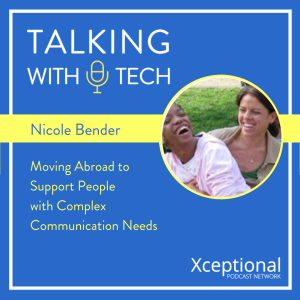
Wednesday Nov 27, 2019
Wednesday Nov 27, 2019
We need your help to keep Talking with Tech going strong! If you are a loyal listener, please support our podcast at patreon.com/talkingwithtech.
This week, Chris interviews Nicole Bender, an AAC specialist who was inspired to move from the US to Thailand to help people with developmental disabilities to communicate! Nicole shares her fascinating experiences deciding to move to another country, her challenges and successes working with AAC in Thailand, and why Nicole loves working abroad so much. Before the interview, Rachel gives her much awaited update on her experiences in Nepal, including adapting her training to help people in a developing country, traveling to far-flung locations, blending in with the locals, and more!
Key ideas this week:
🔑 Nicole makes great use of Saltillo’s “Activity First Approach” - We pick a motivating topic, fill in words in the different sections on the visual, and think about what we need to say or do to get the child to say targeted phrases.
🔑 Song activities for AAC - some families with a song-based activity before working on core words. The family sings songs together and points at the pictures as they sing. It can help in some cases get the family more comfortable with picture-based vocabulary.
🔑 It is important to think about culture when choosing AAC pictures to use. In some cases, the picture is not culturally appropriate’. For example, Nicole found out that a picture of someone putting their feet to signify “take a break” in Thailand isn’t used because putting up your feet and pointing them at someone is considered rude.
Visit bit.ly/twtpod for access to previous episodes, resources, and CEU credits that you can earn for listening to TWT episodes!
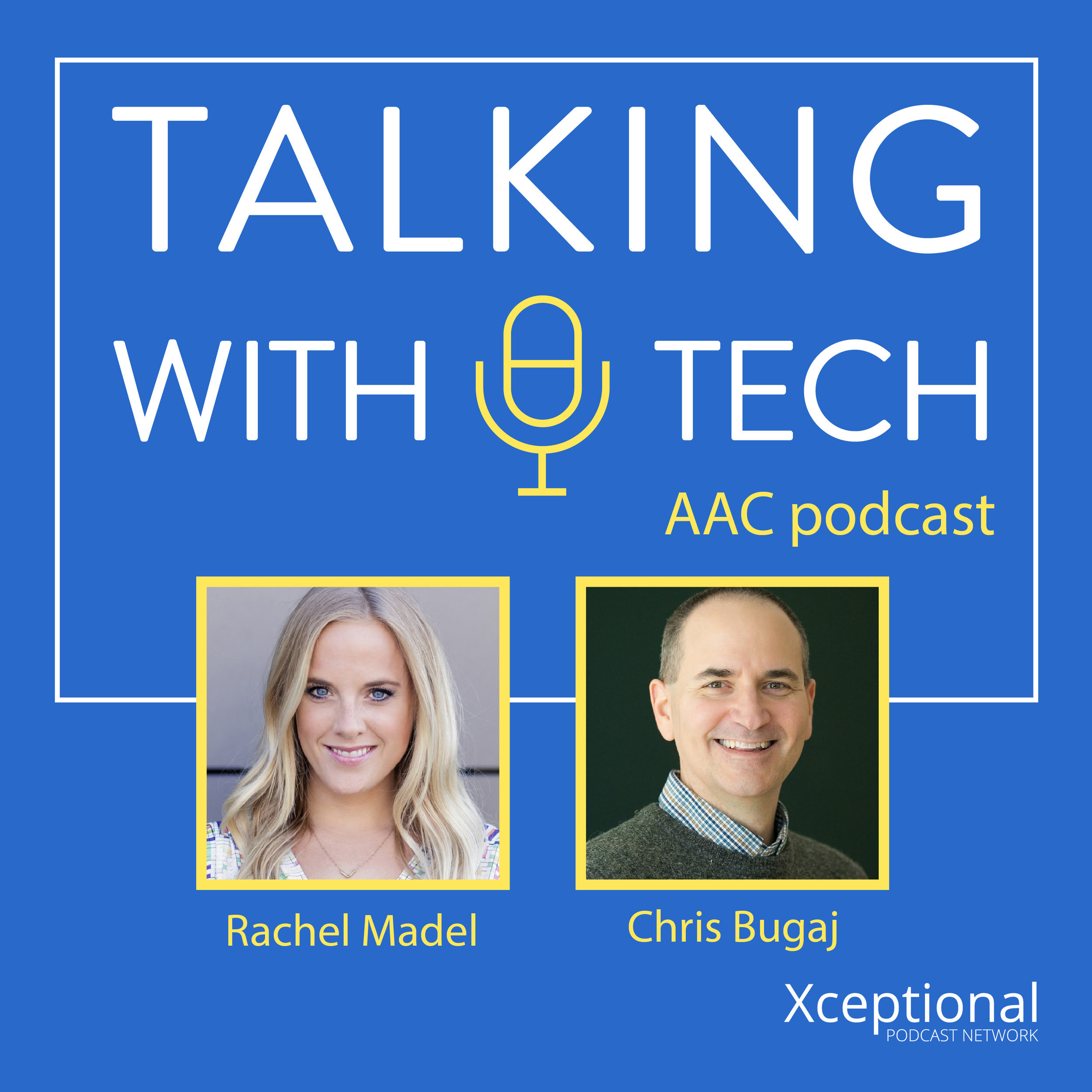
Join AAC experts Rachel Madel and Chris Bugaj as they dive into a weekly discussion about all things AAC (Augmentative and Alternative Communication). Every episode they deliver practical resources, clinical guidelines and relevant research to help clinicians better utilize technology for individuals with complex communication needs.
Episodes include interviews with industry thought-leaders, clinicians, parents, researchers and app developers to keep you on the pulse of the educational technology scene and better support communication through the use of technology.


